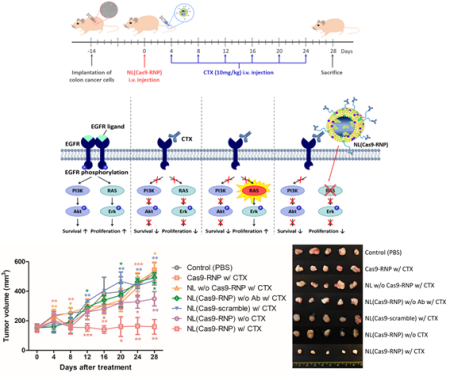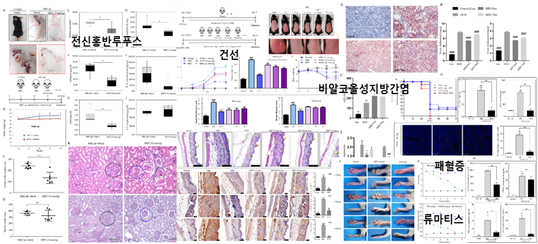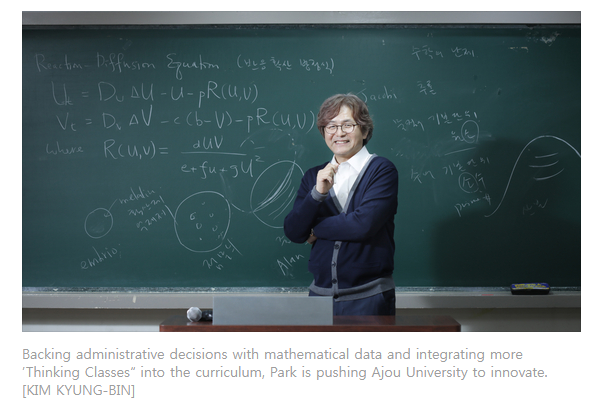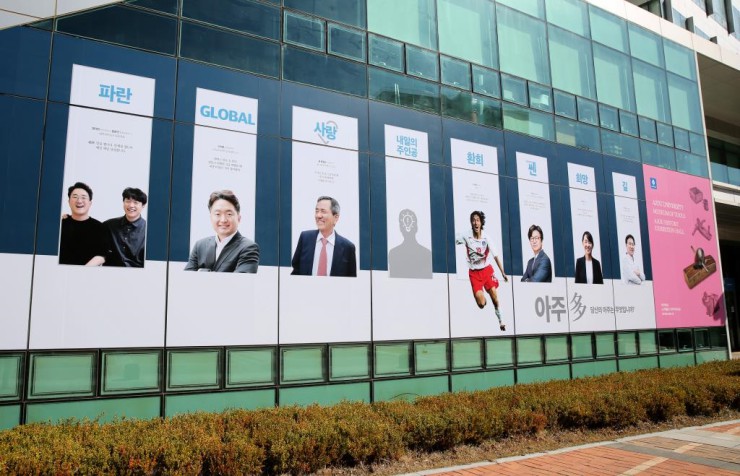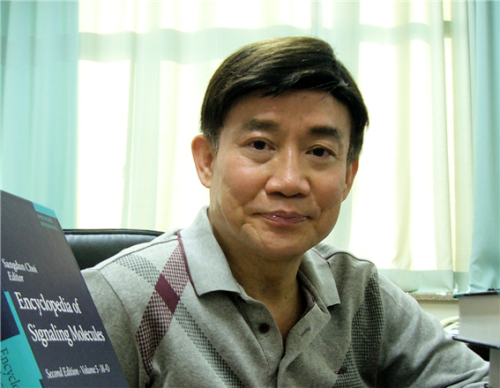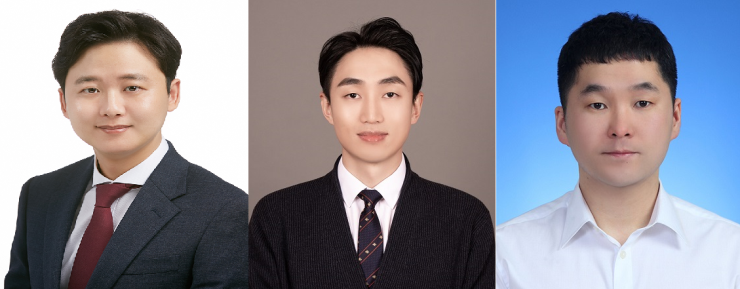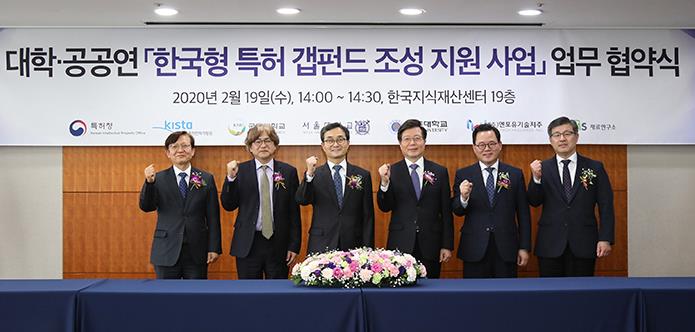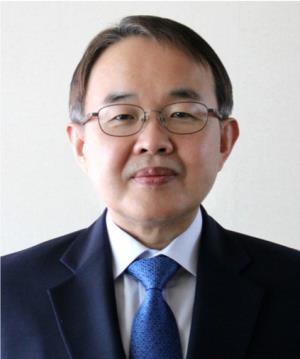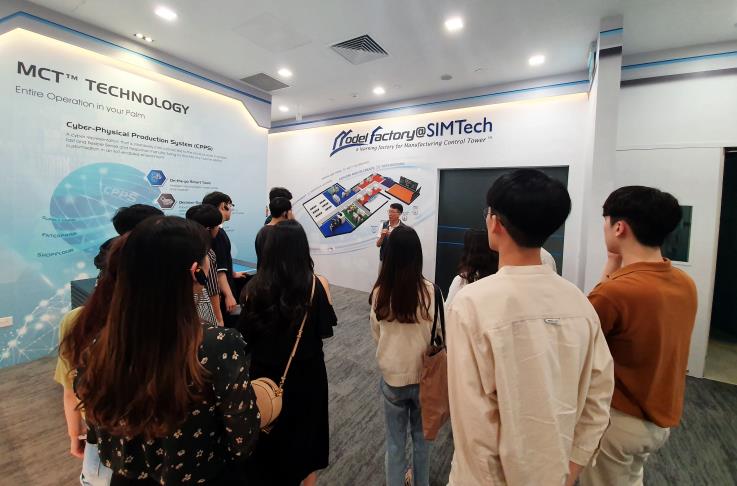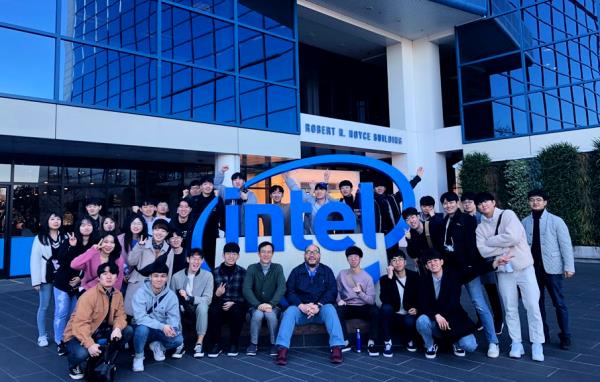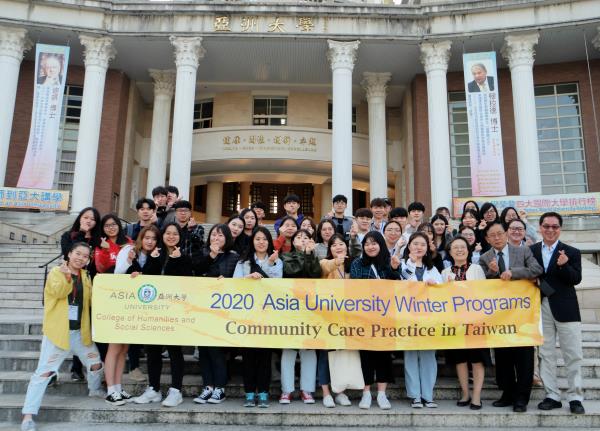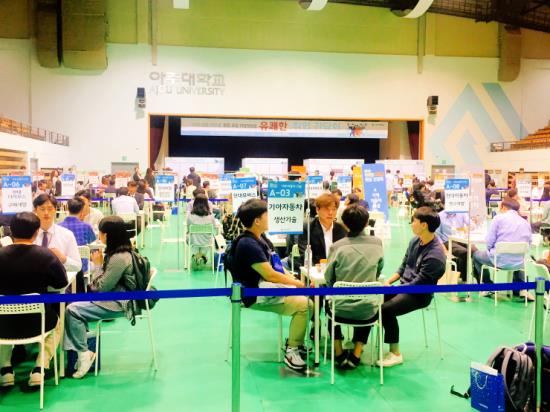-
A team of Ajou University researchers led by Prof. Yoon Tae-jong has succeeded in developing a treatment for colorectal cancer using gene editing. The cure is specifically meant for colorectal cancer patients with gene mutations on whom other more common therapies do not work. Prof. Yoon (College of Pharmacy) teamed up with Prof. Cho Young-seok of the Catholic University (Department of Internal Medicine, College of Medicine) to develop a gene editing technique that involves mounting a gene-editing structure onto a nano-size carrier to edit genetic mutations that complicate colorectal cancer treatment. The result of their collaboration was published in an online issue of Nano Research, a widely recognized international journal, on April 4, 2020, with the title, “Gene editing particle system as a therapeutic approach for drug-resistant colorectal cancer.” Cetuximab is a widely used treatment for colorectal cancer, but there are also a significant number of patients whose KRAS gene mutation renders them resistant to the drug. The number of patients newly diagnosed with colorectal cancer is on the rise worldwide due to the increase in modern and unhealthy diets. Finding effective cures to this particular cancer is therefore a popular and important topic of pharmaceutical research, with much of the current research focusing on antibodies. The conventional approach to treatment is to introduce a drug that binds to the EGFR receptor to inhibit the growth and survival of cancerous cells. Nearly 60 percent of colorectal cancer patients, however, are genetically resistant to this type of treatment. The prognosis for these patients with the KRAS gene mutation is rather dim. Although a growing number of researchers focus on finding alternative cures for patients with the KRAS gene mutation, that particular genetic mutation facilitates patient relapse, raising the demand for a more fundamental therapeutic approach. Although scientists have speculated that gene editing could pave the way to a useful alternative, they have been struggling to overcome the resulting inefficiency, as these protein-based genetic editing techniques turn quite volatile in vivo. Prof. Yoon’s team thus introduced this breakthrough, whereby they demonstrated that mounting the gene-editing protein onto a nano-size carrier could effectively treat colorectal cancer. The team applied a nano-liposome structure as a carrier for the gene-editing technique that can get to and remove the mutated KRAS gene. By inserting a cancer-targeting antibody into the surface of this nano-structure, the researchers were able to maximize stability and efficacy of the gene editing. In an in-vivo test, the gene-editing structure had an efficiency of 60 percent in targeting cancerous tissues. The technique had a definitively more therapeutic effect on targeted animals as compared to the control group. Prof. Yoon explained: “Existing gene editing techniques rely on viral carriers that require adaptation in vivo before their effects appear. This meant low efficiency and increased risk of off-target editing. Although protein-based gene editing techniques have emerged as an alternative, the fact that these protein carriers were broken down in vivo by enzymes meant the targeting efficiency was inevitably compromised as well.” His team therefore came up with a nano-structure capable of in-vivo adaptation to enhance gene editing stability and efficiency, thereby significantly improving the overall therapeutic value of the gene editing technology in cancer treatment. Prof. Yoon commented: “At present, gene editing in the context of cancer treatment is mostly used to regulate the activity of immune cells in vitro. With our discovery, we expect the medical community to be able to inject gene-editing structures directly into patients’ bodies to maximize the effect of treatment.” The KRAS gene mutation accounts for complications in treatment beyond colorectal cancer, to include treatment for pancreatic, lung, ovarian and other types of cancer. Nano-gene editing is therefore desperately needed to enable cancer patients to receive the life-saving treatment they need. Prof. Yoon has been researching nano-materials capable of effectively delivering diverse biomaterials into cells and tissues for the last two decades. In recent years, he has concentrated on adapting nano-technology to gene editing so as to enhance the latter’s in-vivo stability and cell permeability and also to facilitate localized treatment. Prof. Yoon is also the CEO of Moogene Medi Inc., part of N4U Tech Holdings Inc., which leads Ajou University’s industrial-academic collaboration programs. He intends to have Moogene Medi organize the clinical trials for his team’s groundbreaking discovery.
-
418
- 작성자OI***
- 작성일2020-05-15
- 4357
- 동영상동영상
-
A team of researchers at Ajou University, including Professors Choi Sang-dun and Kim Wook, has found a cure for several autoimmune inflammatory diseases. The team has successfully demonstrated the efficacy of their product in treating diseases like systemic lupus erythematosus (SLE) and rheumatoid arthritis (RA). The team’s groundbreaking paper was published in an online issue of Biomaterials, an international journal, on March 17, 2020. Professor Choi (Dept. of Molecular Science and Technology, Graduate Dept. of Life Sciences) led the work as the corresponding author, with participation from other Ajou faculty members, including Profs. Kim Wook (Molecular Science and Technology), Suh Chang-hee (Dept. of Rheumatology, School of Medicine), and Kim Soon-sun and Cheong Jae-youn (both Dept. of Gastroenterology, School of Medicine). Research Professor Masaud Shah and Prof. Lee Sang-ho (Division of Nephrology, Department of Internal Medicine at Kyung Hee University Hospital at Gangdong) also participated. Kim Gi-young and Asma Achek, both studying molecular science and technology at Ajou, were also listed as co-principal investigators. The researchers developed a peptide-based treatment for autoimmune inflammatory diseases, and demonstrated its efficacy in treating non-alcoholic steatohepatitis (NASH), SLE, RA, eczema and sepsis in animals. An autoimmune disease is an abnormal immune response of the body to its own tissues or cells. There are approximately 80 autoimmune diseases that have been identified so far. Inflammatory diseases refer to a broad array of diseases in which inflammation is a major symptom, and can include NASH, sepsis, and even Alzheimer’s. There are mainly two mechanisms by which autoimmune and inflammatory diseases occur: either in response to an infection by an outside pathogen or as a non-infectious response to substances generated within the immune host itself. Abnormal activation of the Toll-like receptors (TLRs) is involved in both cases, but not much more is known. The Ajou team of researchers has discovered a peptide (MIP2) that can inhibit the activity of TLRs across a wide range of situations to rein in inflammatory cytokines. Prof. Choi explained: “We have discovered that injecting this peptide, MIP2, into test models cured them of NASH, SLE, RA, eczema, and sepsis. In addition, we are researching and testing the effect of this peptide on inhibiting inflammasomes and thereby possibly treating other inflammatory diseases, including Alzheimer’s, type-II diabetes, and multiple sclerosis.” The project was organized with support from the R&D-Centered Hospital Support Program of the Ministry of Health and Welfare, as well as the Basic and Original Research Support Program, co-sponsored by the Ministry of Science and ICT and the National Research Foundation of Korea.
-
416
- 작성자OI***
- 작성일2020-05-15
- 4425
- 동영상동영상
-
Ever since he was young, Park Hyung-ju, 56, has always dreamed of earning the Fields Medal, the most prestigious academic award a mathematician can hope to achieve. He was especially concerned with solving the Jacobian Conjecture, one of the great mathematical mysteries, unsolved ever since it was first conceived in 1939. Unfortunately, Park has not solved the problem just yet, maybe because for the past few years, he has been preoccupied with another great mystery: the problem of Korean education. Now, Park has taken hold of the steering wheel. Two years ago, he was inaugurated as the president of Ajou University — which has been aspiring to cement its name as the “MIT of Asia” — located in Suwon, Gyeonggi. As Park noted, “Korean students are outstanding,” referring to how Korea usually places first or second in the International Math Olympiad, essentially the most prestigious mathematics competition for students not old enough to attend university. It is also a good indicator of future success in mathematics: one in three Fields medalists have been participants in the Olympiad. And here lies the new mystery Park is determined to solve: despite Korea’s success in the Olympiad, not a single Korean has won the Fields Medal. While Park believes that issues need to be resolved for the education system throughout elementary to high school, a major paradigm shift is required for tertiary education in Korea as well. In fact, he believes the coronavirus outbreak provides the perfect opportunity to do away with traditional but ineffective teaching methods and replace them with more innovative ones. Kim recently sat down for an interview with the JoongAng Ilbo to discuss his approach to the problems posed by the outbreak, explaining current issues persisting within the university and how some new initiatives at Ajou could provide answers. Below are edited excerpts of the interview. Q. What are some changes that you realized need to take place in Ajou University? A. I personally place great importance on data and statistics. Recently when I questioned the admissions office personnel on why they made a certain decision, they would answer that they just used their intuition. But such vagueness is troubling. Decisions must be backed by data, whether the issue is about essay examinations, the school curriculum, or the College Scholastic Ability Test [CSAT]. So it is a data-driven approach. My confidence in the data-driven approach has only grown stronger after I became the president of the university. For example, Ajou University’s post-graduation employment rate is ranked third in the country. Before analyzing the data, people figured that students with high grades at the time of admission and graduation will yield good employment outcomes. But a close study of available data actually revealed that students who followed an interdisciplinary approach to their education, while pursuing a wide range of activities such as competitions and individual research, had much higher post-graduation employment rates. The answer to why we have high employment outcomes is clear here. Guesswork and intuition cannot win out over hard data. Ever since President Moon Jae-in entered office, the Korean government has started pushing universities to admit more students by regular admissions as opposed to early admissions. [In Korea, regular admissions are based significantly on CSAT scores, a standardized test for universities. The test can be taken only once a year. For early admissions, universities accept students mostly based on other factors such as high school grades and extracurricular activities.] How is Ajou University approaching this early admissions versus regular admissions issue? Our university’s early admissions versus regular admissions ratio is different compared to other universities. On average, we admit 80 percent of students based on early admissions, while we admit the other 20 based on regular admissions. Rather than pursuing a set-ratio, we fine-tune our ratios depending on the needs of the specific major. How is the university faring with the shift to online classes due to the coronavirus outbreak? We were relatively well prepared for this change. Previous to the outbreak, 42 classrooms were outfitted with recording technology, and we had a video recording studio prepared as well. We had also already analyzed data about students’ study patterns, although the outbreak gave us even more data to work with through the online classes. [For Park, the “Thinking Class” is a major aspect of his initiative. Inspired by the teaching styles from the École polytechnique fédérale de Lausanne (EPFL), a prestigious university located in Switzerland, Park wants Korean classes to focus less on repetition and more on problem solving. In the Thinking Class program, students learn the basic concepts online and come prepared to do more challenging thinking with these concepts offline with their peers and professors in the classroom.] How do you envision the university’s future? A university is a place for students to work out problems, not to absorb knowledge. My short-term goal is to have the Thinking Class comprise half of our available classes. Both students and professors work three times harder in these Thinking Classes. Although much more effort is required, it yields great results: EPFL’s post-graduation employment rates soar above that of other universities. And recruiting businesses want classes to be like this as well. The future of education lies in classes like these, ones that emphasize “blended learning” — utilizing a mixture of online and offline classes. This ratio of online to offline classes will ultimately be determined based on the students’ abilities, the major in question and the school learning environment. Any other changes planned for the university? At Ajou University, students have the opportunity to follow the Paran Academic Semester System. “Paran” [meaning blue in Korean] is one of Ajou University’s school colors. But it has two additional meanings as well. One being to “shatter the eggshell” [that is, to shatter existing paradigms], and the other being to achieve one’s dreams. In this academic calendar, students independently design their own curriculum and get graded accordingly. Starting from 2016, over the past eight semesters, a total of 775 students participated in this program. Also, unless students actively use knowledge, they forget the concepts that they learn in class after the semester is over. But that is all going to change soon. The university is going to integrate a study-activity plan into the curriculum. By the end of the class, students would have not only studied the topic but would have actively engaged with the concept as well. Finally, even after the coronavirus situation is fully resolved, it is important to keep using online-based learning. Ajou University will try to maintain the number of online classes at between 30 to 50 percent. This way, students will learn concepts by themselves online and practice using these concepts offline in the classroom with the professor. We want to make this type of class — one which really pushes students to exercise their intellectual muscles — to become the baseline of the “Ajou Way.” What do you think of the general state of education in Korea? In Korea, average students, the gifted, and the exceptional ones are all in one classroom. But instead of a one-size-fits-all system, Korea needs to work on providing options for the gifted and exceptional students. I have met many gifted students in my life, and I have met so many world-class geniuses as well. Geniuses just do not like repetitive classes. But the classes in Korea rely on repetition, and, naturally, it is difficult for geniuses to prosper in this kind of environment. While many students in America choose to go law school or medical school, two in three Korean students choose to major in math. So it is normal to have high expectations for our students. Our professors and students must focus on solving the big questions, not the small ones. BY YANG YOUNG-YU, ANDREW LEE [lee.joongi@joongang.co.kr] Korea Joongang Daily: https://koreajoongangdaily.joins.com/2020/05/05/etc/fields-medalists-korean-education-Ajou-University/20200505192100235.html
-
414
- 작성자OI***
- 작성일2020-05-06
- 5342
- 동영상동영상
-
2020-03-11 The "Shining Stars from Ajou University" display was unveiled on the wall of the University's Yeonam Hall.The display contains the stories of eight Ajou University alumni, including the late Pil Sang Hwang (Department of Mechanical Engineering, entrance class of 1973), a member of the first graduation class who donated all of his assets as well as his own body.The display also introduces the philosophies of President Eon Tae Ha (Department of Industrial Engineering, entrance class of 1980) from Hyundai Motor Company and Jin Mo Kang (Department of Physics, entrance class of 1988), who founded the IT services provider ITCENGROUP.Former star soccer player Jung Hwan Ahn (Department of Business Administration, entrance class of 1994), Professor Ji Hwan Lee (Department of Industrial Engineering, entrance class of 1999) from Purdue University in the U.S., and Judge Yu Ri Shin (Department of Law, entrance class of 2002, graduate of the Law School) are also featured in the work.Other alumni introduced in the display include Yoon Geun Song (Department of Culture and Contents, entrance class of 2012) and Da Bin Jeong (Department of Korean Language and Literature, entrance class of 2012), who are running the video content creation company Bamboo Network, based on their experience of making a web drama as part of the Paran Semester Program – Ajou Creative Activity Program.The display is part of the University's efforts to foster and spread its unique culture by interconnecting prominent Ajou alumni and to present role models for the current students.
-
412
- 작성자OI***
- 작성일2020-04-03
- 5062
- 동영상동영상
-
2020-03-09 Ajou University Professor Sang Dun Choi developed a medicine for Systemic Lupus Erythematosus, an autoimmune disease in which the body's immune system mistakenly attacks healthy tissue in many parts of the body.The research team led by Professor Choi (Department of Biological Science, Graduate School's Department of Molecular Science and Technology, pictured above) said that it succeeded in deriving an innovative therapeutic substance following the verification of its remedial effect in the lupus-related murine model.A paper on the findings was published in the February edition of The EBioMedicine, which ranks within the top 7.7 percent among medical journals, under the title "A peptide derived from the core β-sheet region of TIRAP decoys TLR4 and reduces inflammatory and autoimmune symptoms in murine models."Systemic Lupus Erythematosus involves various symptoms such as skin rashes, photosensitivity, arthritis, canker sores, nephritis, hematocytopenia, panangiitis, and serositis. It is known to occur in those with genetic predispositions when they are infected with certain viruses or influenced by environmental factors like ultraviolet rays.In Korea, the number of lupus patients has been increasing from 20,902 in 2015 to 26,556 in 2019 and more than 5 million people are known to suffer from lupus around the world. In most cases, women in their 20s and 30s fall victim to lupus.The team led by Professor Choi identified a toll-like receptor, which is activated by an intrinsic damage-associated molecular pattern, as a factor accelerating the autoimmunocyte reaction and verified the therapeutic effect of the TLR7/9-controlling substance in murine models.The research was conducted with the support of the Original Technologies Development Project carried out by the Ministry of Science and ICT and the National Research Foundation of Korea. Professor Chang Hee Suh (School of Medicine) and Professor Wook Kim (Graduate School's Department of Molecular Science and Technology) from Ajou University and Professor Dae Hyun Hahm from Kyung Hee University School of Medicine also participated in the research, and the findings are being promoted by the National Research Foundation of Korea as a research achievement that provides direct benefits to the public.Professor Choi said, "Medicines that are based on TLR control can be applied to various other autoimmune and inflammatory diseases once their effect is proven for a single autoimmune disease," adding, "Therefore, our findings are highly likely to be developed into a blockbuster medicine."
-
410
- 작성자OI***
- 작성일2020-04-03
- 5184
- 동영상동영상
-
2020-02-25 Ajou University graduates have been appointed as professors at domestic universities. Starting this spring semester, June Seok Lee will work as a professor at Dankook University's School of Electronics and Electrical Engineering and Yeong Jong Ko will teach at Pukyong National University's Department of Electrical Engineering.Professor Lee obtained his master's and doctoral degrees from Ajou University's Power Electronics Lab (guiding professor Kyo Beum Lee) under the Department of Electrical and Computer Engineering and has authored about 50 academic papers.He said, "Participating in projects involving industry, academia, and research at Ajou University were of great help for me to collaborate with many corporations afterwards," adding, "I hope that the University students take pride in studying in such an excellent research environment."Professor Ko obtained his doctoral degree from Kiel University in Germany after receiving his master's degree from Ajou University's Power Electronics Lab. He has been studying software-based failure diagnosis to improve the reliability of electricity conversion equipment used for power generation from new and renewable energy sources, including wind and solar power.He stated, "I was able to take initiatives in conducting creative research activities while studying at Ajou University," adding, "I think I developed my abilities and global mindset as a researcher by participating in international academic events."Eui Min Choi, who obtained his master's degree from Ajou University and doctoral degree from Aalborg University in Denmark, was appointed as a professor at the Department of Electronic and IT Media Engineering of Seoul National University of Science and Technology in 2018. * From the far left in the above pictures are Professor Yeong Jong Ko (Pukyong National University), Professor June Seok Lee (Dankook University), and Professor Eui Min Choi (Seoul National University of Science and Technology).
-
408
- 작성자OI***
- 작성일2020-04-03
- 5155
- 동영상동영상
-
2020-02-20 Ajou University has been selected as a Patent Gap Fund operator by the Korean Intellectual Property Office (KIPO). The Patent Gap Fund aims to support technology commercialization by closing the gap between the patents owned by universities and public research institutes and the technologies preferred by businesses.On February 19th, KIPO signed agreements on supporting the Patent Gap Fund at the Korea Intellectual Property Service Center with four institutional operators, including Ajou University, Kookmin University, Seoul National University, and the Korea Institute of Materials Science.Ajou University is participating in the project through N4U Tech Holding Inc., which was founded together with Kookmin University. Over the next three years, each institutional operator is set to receive KRW 200-400million of technology commercialization funds per year.The Patent Gap Fund will support technology commercialization via patent verification, prototype product manufacturing, and technology marketing, etc. KIPO plans to operate the Fund in a sustainable manner – i.e., through reinvesting licensing fees into other promising technologies after collecting them from transferring technologies to businesses.Ajou University is separately pursuing its own program called "Ajou Gap Fund" as part of its industry-academia cooperation under the 2019 University Innovation Support Project. It is expected to create synergy with the KIPO Gap Fund.A total of 12 universities and research institutes applied for the KIPO Gap Fund Project this year.KIPO stated, "We expect that technology holding companies like N4U will create synergy by combining excellent patented technologies from universities," adding, "We will actively support the institutions that seek to market their collection of promising patents."N4U Tech Holding Inc. was established through a consortium of universities to create a virtuous circle in which the universities invest revenue from business activities back into education and research. It also seeks to maximize the achievements made from R&D and intellectual-property-based technology commercialization by partner universities through a subsidiary.
-
406
- 작성자OI***
- 작성일2020-04-03
- 4757
- 동영상동영상
-
-
404
- 작성자OI***
- 작성일2020-04-03
- 4825
- 동영상동영상
-
-
402
- 작성자OI***
- 작성일2020-02-20
- 5569
- 동영상동영상
-
-
400
- 작성자OI***
- 작성일2020-02-20
- 6483
- 동영상동영상
-
-
398
- 작성자OI***
- 작성일2020-02-20
- 5462
- 동영상동영상
-
According to the "Employment Statistics of Graduates of Higher Educational Institutions for 2018," which was announced by the Ministry of Education, 71.6% of Ajou University graduates found jobs, up 3.3% from the previous year. Ajou graduates’ job retention rate, an indicator of employment quality, also rose 0.4% from a year earlier to 88.9%. Ajou University ranked 4th in the two figures among 58 four-year universities with at least 2,000 graduates. The average graduate employment rate of the surveyed universities was 64.2%, and Ajou's 71.6% reached 5.6 percentage points higher than the 66% average employment rate of the graduates from top 30 universities in the Joongang Ilbo University Evaluation. After being designated as the University Job Center in October 2015, Ajou University has been operating a well-organized career and employment coaching system, which includes the One-on-One Consulting Service by Expert Counselors, Meeting with the University Alumni from Diverse Industries, and Hidden Champions Selected by the University Students. For graduates and students who postponed graduation, Neo Challenge, a customized program consisting of a student capability diagnosis, special lectures, and individual consulting, is also available. In addition, the University Job Center is functioning as a career consulting hub by opening its programs to young people from the region as well as Ajou students. Professor Jeong Whon Yu (Director of the University Job Center) said, "We will provide even better services by collaborating with local employment and welfare centers and the Gyeonggi-do Job Foundation," adding, "I hope that young people in our area will find valuable job information from Ajou University's student career development system." The employment data were compiled as of the end of 2018 and based on a survey of those who graduated in August 2017 and February 2018. For the job retention rate, the Korean government monitored whether those surveyed maintained their health insurance for a year after they were added to corporate health insurance as of the base date.
-
396
- 작성자OI***
- 작성일2020-02-20
- 5085
- 동영상동영상

